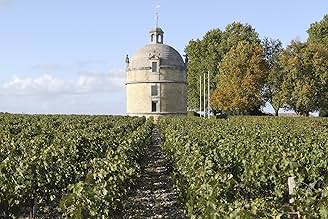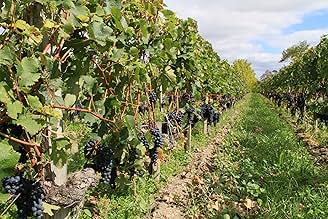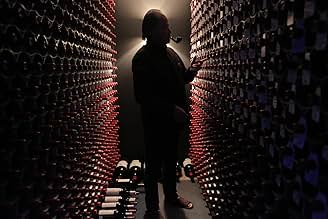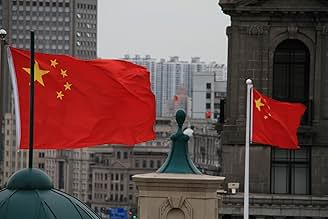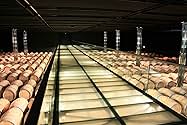AVALIAÇÃO DA IMDb
6,6/10
1,4 mil
SUA AVALIAÇÃO
Adicionar um enredo no seu idiomaThe great chateaux of Bordeaux struggle to accommodate the voracious appetite for their rare, expensive wines, which have become a powerful status symbol in booming China.The great chateaux of Bordeaux struggle to accommodate the voracious appetite for their rare, expensive wines, which have become a powerful status symbol in booming China.The great chateaux of Bordeaux struggle to accommodate the voracious appetite for their rare, expensive wines, which have become a powerful status symbol in booming China.
- Direção
- Roteiristas
- Artistas
- Prêmios
- 2 vitórias e 4 indicações no total
- Direção
- Roteiristas
- Elenco e equipe completos
- Produção, bilheteria e muito mais no IMDbPro
Avaliações em destaque
I was only mildly interested in watching this documentary and turned it on expecting very little. After all, I rarely ever drink French wines and just don't have much interest in them. However, I soon realized that in many ways the film isn't really about wines at all- -it's all a metaphor for the sudden and very dramatic rise in the Chinese economy and their subsequent buying power. It also, in many ways, is much like the entrance of Americans into the world economy in the 20th century--when some folks were more interested in spending their money on some hot commodity instead of what is quality. In the film, the Chinese elite seem too interested in specific famous labels as opposed to actually DRINKING the wines-- and as a result of folks stockpiling the wines and paying top dollar, the wine prices on the 'best' wines are astronomical and no one can afford to drink them! All in all, a fascinating film that really gets you to think.
This is an Australian-produced doco, looking at the history of wines from Bordeaux.
It is 75 minutes long.
After 75 minutes, I was aware that they have been making wines in Bordeaux since the Romans brought the vines; that Napoleon III had the wines graded in 1855 and the grades given remain to this day; that conditions come together for a great vintage about every 20 years; that wine is bought as an investment; that Americans have stopped buying it but the Chinese now do; that some French are sniffily xenophobic about dealing with the Chinese and that if the Chinese ever stop buying, the market may collapse.
Those facts took 75 minutes to explain. 75 very long minutes.
Some nice aerial photography. And looking at beautifully designed and constructed French chateaux is always easy on the eye.
The film had a nice, laconic commentary from Russell Crowe whose smoky, tobacco-enhanced voice fitted the subject well.
But it was all just too superficial, too under-researched with not enough of interest to fill the film's time span. Some more history would have been welcome; the Great French Wine Blight of the late 1850s post-dated Napoleon III's gradings – didn't the blight make them obsolete? This question wasn't addressed but would seem fundamental to an evaluation of Bordeaux. Still, I'm sure had I gone to France's bucolic beauty spots to research such a film, I too would have been so distracted drinking the stuff I'd have forgotten the reason for the visit.
It is 75 minutes long.
After 75 minutes, I was aware that they have been making wines in Bordeaux since the Romans brought the vines; that Napoleon III had the wines graded in 1855 and the grades given remain to this day; that conditions come together for a great vintage about every 20 years; that wine is bought as an investment; that Americans have stopped buying it but the Chinese now do; that some French are sniffily xenophobic about dealing with the Chinese and that if the Chinese ever stop buying, the market may collapse.
Those facts took 75 minutes to explain. 75 very long minutes.
Some nice aerial photography. And looking at beautifully designed and constructed French chateaux is always easy on the eye.
The film had a nice, laconic commentary from Russell Crowe whose smoky, tobacco-enhanced voice fitted the subject well.
But it was all just too superficial, too under-researched with not enough of interest to fill the film's time span. Some more history would have been welcome; the Great French Wine Blight of the late 1850s post-dated Napoleon III's gradings – didn't the blight make them obsolete? This question wasn't addressed but would seem fundamental to an evaluation of Bordeaux. Still, I'm sure had I gone to France's bucolic beauty spots to research such a film, I too would have been so distracted drinking the stuff I'd have forgotten the reason for the visit.
This is a documentary for wine lovers. Beer drinkers need not apply.
The film is tastefully done, great photography, beautiful soundtrack. Needs to be watched with a glass of red wine in hand, as it really whets your appetite.
Should it go deeper into the subject? Should it explain that the great French Wine Blight did NOT make the 1855 classification obsolete, because the vines were grafted to Chilean roots (resistant to the phylloxera) imported hastily in thousands, to save them (not only in France, but in other parts of Europe too)?
Maybe. That would have made for a slightly longer film, perhaps more thrilling (Will the vines be completely lost? Who could save them? Wait! Up in the sky: it's a bird... it's a plane... No, it's super-vine! Actually, it was "la super viña", from Chile).
But it would have been a different film, missing the elegant balance of this one.
Perhaps this film's success will spur a sequel: "Red Obsession 2 - Attack of the insects from Hell". It will need a different soundtrack (by Hans Zimmer?) and a different narrator; Russell Crowe is too mellow for that!
The film is tastefully done, great photography, beautiful soundtrack. Needs to be watched with a glass of red wine in hand, as it really whets your appetite.
Should it go deeper into the subject? Should it explain that the great French Wine Blight did NOT make the 1855 classification obsolete, because the vines were grafted to Chilean roots (resistant to the phylloxera) imported hastily in thousands, to save them (not only in France, but in other parts of Europe too)?
Maybe. That would have made for a slightly longer film, perhaps more thrilling (Will the vines be completely lost? Who could save them? Wait! Up in the sky: it's a bird... it's a plane... No, it's super-vine! Actually, it was "la super viña", from Chile).
But it would have been a different film, missing the elegant balance of this one.
Perhaps this film's success will spur a sequel: "Red Obsession 2 - Attack of the insects from Hell". It will need a different soundtrack (by Hans Zimmer?) and a different narrator; Russell Crowe is too mellow for that!
"Red Obsession" makes the viewer appreciate the true artistry involved in wine making, and the asomatous beauty involved in wine tasting (ordering wine at the Olive Garden is not wine tasting.) Drinking a good wine can be an orgasmic physical experience, as well as a genuinely spiritual one. Some of the interviewed eloquently describe an exquisite wine as an enduring experience.
The scenic views of French countryside and century-old vineyards are astounding. "Red Obsession" has some of the most spectacular cinematography this reviewer has ever seen. This alone is a very good reason to watch.
The film eventually moves into the current politics of the luxury wine industry. The epicentre of this business is currently China, which is now the largest importer of Bordeaux wines in the world. The rest of the film can be summarized in a sentence spoken by one of the commentators: "When the Chinese buy the wine, they buy the wine as a symbol of their status." The film's content, which includes exploration of the shifting market, and the changing production and consumption of premier château wines, was very informative and interesting to this uncultivated viewer. But the film is as untroubled as the well-off Chinese in it, who think nothing of dropping tens of millions of dollars buying wines, creating connoisseur clubs, or purchasing antiquated French chateaus.
Overflowing with conceit and extravagance, "Red Obsession" turns out mostly shallow and pretentious. The film doesn't ask any questions, or challenge conventional thinking, or break any new ground. Yes it is a documentary, but it is not constructive filmmaking.
screenplayisles.blogspot
The scenic views of French countryside and century-old vineyards are astounding. "Red Obsession" has some of the most spectacular cinematography this reviewer has ever seen. This alone is a very good reason to watch.
The film eventually moves into the current politics of the luxury wine industry. The epicentre of this business is currently China, which is now the largest importer of Bordeaux wines in the world. The rest of the film can be summarized in a sentence spoken by one of the commentators: "When the Chinese buy the wine, they buy the wine as a symbol of their status." The film's content, which includes exploration of the shifting market, and the changing production and consumption of premier château wines, was very informative and interesting to this uncultivated viewer. But the film is as untroubled as the well-off Chinese in it, who think nothing of dropping tens of millions of dollars buying wines, creating connoisseur clubs, or purchasing antiquated French chateaus.
Overflowing with conceit and extravagance, "Red Obsession" turns out mostly shallow and pretentious. The film doesn't ask any questions, or challenge conventional thinking, or break any new ground. Yes it is a documentary, but it is not constructive filmmaking.
screenplayisles.blogspot
10rattio18
I was expecting to see a cliché movie, but instead I was overwhelmed. This movie shows exactly what is going on with a cohort of Chinese society. This movie worth it. Antropologically talking, this movie is a must if you want to understand what's going on here. Listen carefully the mix blood woman, she just put in worth my thoughts. Been in China is not the same as seeing China, we have to learn a lot about this country. I just write down everything she said. I think is the key to begging to understand China and Chinese people. AWESOME!!! What we think is right, for others maybe is wrong or even unacceptable, tolerance is the key.
Você sabia?
- ConexõesFeatured in At the Movies: Episode #10.26 (2013)
Principais escolhas
Faça login para avaliar e ver a lista de recomendações personalizadas
Detalhes
- Data de lançamento
- Países de origem
- Centrais de atendimento oficiais
- Idioma
- Também conhecido como
- Red Obsession
- Empresa de produção
- Consulte mais créditos da empresa na IMDbPro
Bilheteria
- Faturamento bruto nos EUA e Canadá
- US$ 13.199
- Fim de semana de estreia nos EUA e Canadá
- US$ 5.060
- 8 de set. de 2013
- Faturamento bruto mundial
- US$ 238.223
- Tempo de duração1 hora 15 minutos
- Cor
- Mixagem de som
- Proporção
- 1.85 : 1
Contribua para esta página
Sugerir uma alteração ou adicionar conteúdo ausente

Principal brecha
By what name was Obsessão Vermelha (2013) officially released in India in English?
Responda



